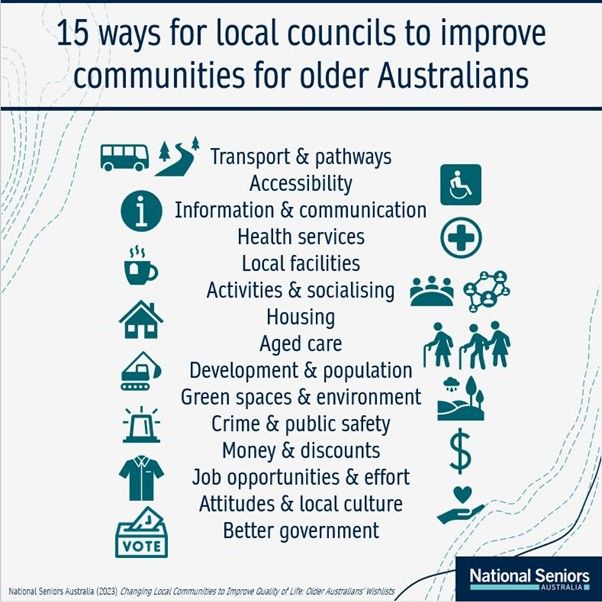Key Points
National Seniors' latest research report about communities and quality of life is based on a survey of thousands of Australians aged 50 and over.
- A large 80% of respondents believe community participation is important for quality of life.
- 54% of those surveyed agreed their community provides older people a good quality of life, but 33% were unsure and the rest disagreed.
- About 1500 respondents suggested improvements to their communities that would enhance their quality of life.
- A special report detailing a 15-item wish list for improving local communities has been produced for local councils.
New research from National Seniors shows many older Australians are satisfied with the quality of life their community provides, but others want big changes.
The new report, titled Older Australians, Community and Quality of Life, is based on responses to four questions about community in the 2022 National Seniors Social Survey.
Thousands of Australians aged 50 and over participated, sharing what community means to them and how it could do better.
The survey asked if respondents believed participating actively in the community can improve a person's quality of life, and a staggering 80% agreed.
Many said community participation enhances physical and mental activity, emotional wellbeing, and a sense of purpose and belonging. They value social connection, relationships and "giving back".
As one 71-year-old put it, "Being part of community is what life is about; sharing, contributing and in turn learning to receive."
But 10% disagreed or said "it depends". Reasons included the health and monetary costs of community participation, a personal preference for a more solitary life, and a dislike of challenging social dynamics.
Most respondents (63%) defined their community geographically, as their local area. But many belong to more than one community, including networks of people who share their experiences and identities, formal groups and religious bodies, or those with common interests and activities.
When we asked respondents if their community provides a good quality of life for older people, over half (54%) agreed.
These lucky respondents told us their communities provide benefits like a diverse range of regular activities and opportunities, a culture of mutual support and respect, convenient amenities to support wellbeing and socialising, and good quality housing options for seniors of all ages.
As one 84-year-old wrote, "Local government in my area encourages older folk to become involved in the activities planned. It is one of the most committed councils supporting its senior residents."
However, 13% disagreed and a surprising 33% selected the "unsure" option.
Some of those unhappy with quality of life in their community wrote about national-scale issues such as aged care, healthcare, pension poverty and housing affordability.
Among the "unsure" respondents, some said they don't feel part of any community, a good community doesn't guarantee good quality of life, or the communities they belong to are mixed in what they provide.

Finally, we asked survey respondents what needs to change in their community to improve their quality of life.
More than 20% of respondents said nothing needs to change, but 1458 people made suggestion for improvement.
Among other things, older Australians want more public transport, local medical services, accessible activities, active communication, and affordable housing. They want less crime, less poorly planned development and less ageism. They also want more transparent local government and greater consultation of older residents in local government decisions.
They are also concerned that they are being shut out from communication or "ghosted".
A 73-year-old spoke for many when they said, "Stop ghosting older persons, like their ideas are stupid and don't fit with current society ideals."
We distilled all the suggestions into a wishlist of 15 themes. Some wishes mirror the World Health Organization's eight domains of age-friendly environments, affirming their universal importance. But others are unique.
To make sure your wishes get to the right people, we produced a second report just on this topic, targeting local councils.
Entitled Changing Local Communities to Improve Quality of Life: Older Australians' Wishlists, National Seniors will use this document to lobby for greater consultation and change in your local community.
You can download both reports at the National Seniors research reports page.






